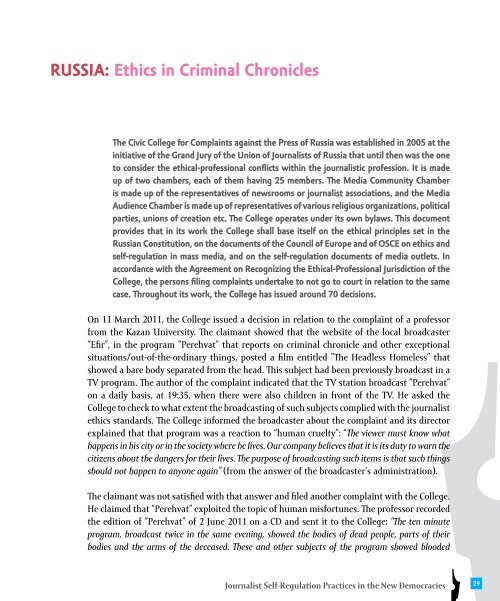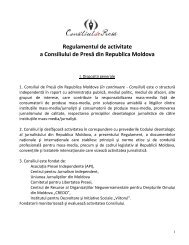Journalist Self-Regulation Practices in the New Democracies - Unesco
Journalist Self-Regulation Practices in the New Democracies - Unesco
Journalist Self-Regulation Practices in the New Democracies - Unesco
You also want an ePaper? Increase the reach of your titles
YUMPU automatically turns print PDFs into web optimized ePapers that Google loves.
Russia: Ethics <strong>in</strong> Crim<strong>in</strong>al Chronicles<br />
The Civic College for Compla<strong>in</strong>ts aga<strong>in</strong>st <strong>the</strong> Press of Russia was established <strong>in</strong> 2005 at <strong>the</strong><br />
<strong>in</strong>itiative of <strong>the</strong> Grand Jury of <strong>the</strong> Union of <strong>Journalist</strong>s of Russia that until <strong>the</strong>n was <strong>the</strong> one<br />
to consider <strong>the</strong> ethical-professional conflicts with<strong>in</strong> <strong>the</strong> journalistic profession. It is made<br />
up of two chambers, each of <strong>the</strong>m hav<strong>in</strong>g 25 members. The Media Community Chamber<br />
is made up of <strong>the</strong> representatives of newsrooms or journalist associations, and <strong>the</strong> Media<br />
Audience Chamber is made up of representatives of various religious organizations, political<br />
parties, unions of creation etc. The College operates under its own bylaws. This document<br />
provides that <strong>in</strong> its work <strong>the</strong> College shall base itself on <strong>the</strong> ethical pr<strong>in</strong>ciples set <strong>in</strong> <strong>the</strong><br />
Russian Constitution, on <strong>the</strong> documents of <strong>the</strong> Council of Europe and of OSCE on ethics and<br />
self-regulation <strong>in</strong> mass media, and on <strong>the</strong> self-regulation documents of media outlets. In<br />
accordance with <strong>the</strong> Agreement on Recogniz<strong>in</strong>g <strong>the</strong> Ethical-Professional Jurisdiction of <strong>the</strong><br />
College, <strong>the</strong> persons fil<strong>in</strong>g compla<strong>in</strong>ts undertake to not go to court <strong>in</strong> relation to <strong>the</strong> same<br />
case. Throughout its work, <strong>the</strong> College has issued around 70 decisions.<br />
On 11 March 2011, <strong>the</strong> College issued a decision <strong>in</strong> relation to <strong>the</strong> compla<strong>in</strong>t of a professor<br />
from <strong>the</strong> Kazan University. The claimant showed that <strong>the</strong> website of <strong>the</strong> local broadcaster<br />
“Efir”, <strong>in</strong> <strong>the</strong> program ”Perehvat” that reports on crim<strong>in</strong>al chronicle and o<strong>the</strong>r exceptional<br />
situations/out-of-<strong>the</strong>-ord<strong>in</strong>ary th<strong>in</strong>gs, posted a film entitled ”The Headless Homeless” that<br />
showed a bare body separated from <strong>the</strong> head. This subject had been previously broadcast <strong>in</strong> a<br />
TV program. The author of <strong>the</strong> compla<strong>in</strong>t <strong>in</strong>dicated that <strong>the</strong> TV station broadcast ”Perehvat”<br />
on a daily basis, at 19:35, when <strong>the</strong>re were also children <strong>in</strong> front of <strong>the</strong> TV. He asked <strong>the</strong><br />
College to check to what extent <strong>the</strong> broadcast<strong>in</strong>g of such subjects complied with <strong>the</strong> journalist<br />
ethics standards. The College <strong>in</strong>formed <strong>the</strong> broadcaster about <strong>the</strong> compla<strong>in</strong>t and its director<br />
expla<strong>in</strong>ed that that program was a reaction to “human cruelty”: “The viewer must know what<br />
happens <strong>in</strong> his city or <strong>in</strong> <strong>the</strong> society where he lives. Our company believes that it is its duty to warn <strong>the</strong><br />
citizens about <strong>the</strong> dangers for <strong>the</strong>ir lives. The purpose of broadcast<strong>in</strong>g such items is that such th<strong>in</strong>gs<br />
should not happen to anyone aga<strong>in</strong>” (from <strong>the</strong> answer of <strong>the</strong> broadcaster’s adm<strong>in</strong>istration).<br />
The claimant was not satisfied with that answer and filed ano<strong>the</strong>r compla<strong>in</strong>t with <strong>the</strong> College.<br />
He claimed that “Perehvat” exploited <strong>the</strong> topic of human misfortunes. The professor recorded<br />
<strong>the</strong> edition of “Perehvat” of 2 June 2011 on a CD and sent it to <strong>the</strong> College: “The ten m<strong>in</strong>ute<br />
program, broadcast twice <strong>in</strong> <strong>the</strong> same even<strong>in</strong>g, showed <strong>the</strong> bodies of dead people, parts of <strong>the</strong>ir<br />
bodies and <strong>the</strong> arms of <strong>the</strong> deceased. These and o<strong>the</strong>r subjects of <strong>the</strong> program showed blooded<br />
<strong>Journalist</strong> <strong>Self</strong>-<strong>Regulation</strong> <strong>Practices</strong> <strong>in</strong> <strong>the</strong> <strong>New</strong> <strong>Democracies</strong><br />
29



